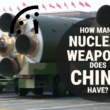Acknowledging reality: A pragmatic approach to Pyongyang
By Shen Dingli, June 1, 2016
With North Korea having conducted its fourth nuclear test in January, the Korean Peninsula seems more distant than ever from denuclearization. Given this reality, what's the most effective way to approach the nuclear problem?
The obstacles to progress are enormous. Pyongyang's inclinations are strongly realist, and the country's leadership sees nuclear deterrence as the ultimate guarantee of security. It will likely continue to see things that way for some time. The North perceives Washington's attitude as essentially realist as well—so Pyongyang is likely betting that US policy toward North Korea will eventually change direction. This is especially true considering that Washington experiences regime change every four or eight years.
The North may in fact believe that Washington, once it accepts the nuclear reality on the Korean Peninsula, will ease sanctions. This calculus may make sense. The United States never approved of Israel's possession of nuclear weapons, but it has had to live with the hard reality of a nuclear Israel—and protect Tel Aviv from the establishment of a Middle East nuclear-weapon free zone. Nor does Washington approve of a nuclear India, and indeed it imposed sanctions on New Delhi following India's 1998 nuclear test. But those sanctions were lifted within days of the 9/11 terror attacks. In 2008 the United States even waived its ban on civilian nuclear cooperation with India—a ban it had imposed through the Nuclear Suppliers Group, which it helped create in 1975 precisely to punish India for its "peaceful" nuclear test in 1974. As for Pakistan, the United States designated that country a major non-NATO ally in 2004 in order to gain Islamabad's cooperation in the fight against terrorism—despite Pakistan's development of nuclear weapons. Meanwhile, President Obama is pursuing normalized relations with Cuba after decades of hostility between Washington and Havana. All this may encourage Pyongyang to believe that Washington will not wait additional decades to normalize relations with North Korea.
Meanwhile, China and North Korea have been allies for decades. But China has been cooperating more closely with the United States on sanctions against North Korea, so Pyongyang likely feels betrayed by Beijing. Then again, considering the rising distrust that characterizes Washington and Beijing's relationship, the North may be betting that China will hedge against any future possibility of US reconciliation with the North.
North Korea has certainly noted China's insistence that sanctions against Pyongyang must not generate instability on the Peninsula, risk war, or create humanitarian problems. China is simply unwilling, whether Pyongyang has nuclear weapons or not, to see North Korea collapse. This stance would seem to ensure North Korea's survival. In fact, Beijing may be more concerned about Washington's "rebalancing" in Asia than it is about Pyongyang's nuclear program. Beijing and Washington may cooperate on North Korea to some degree, but they don't trust each other, and both sides will hedge their bets. This could well play into North Korea's hands, and compromise the effectiveness of US-China collaboration.
Consequently, the Korean Peninsula won't likely be free of nuclear weapons any time soon. So any successful approach to the Korean nuclear issue must be incremental, pragmatic, and cooperative in nature; and must provide assurances to all sides. North Korea will only be enticed by denuclearization proposals that espouse a win-win philosophy.
What might be workable, on an interim basis, is to demand of North Korea a "three noes" policy: no further development of nuclear weapons (including nuclear tests); no transfers of nuclear weapons outside North Korean territory; and no using (or threatening to use) nuclear weapons. Essentially, Pyongyang would be asked to accept a "nuclear freeze" regime—which would include a unilateral arms control ceiling and an appropriate verification system. In return, North Korea would receive a package of benefits including a multilateral security assurance arrangement; initiation of a diplomatic process toward normalization of North Korea's relations with the United States and other nations; and removal of economic, trade, and investment sanctions—if Pyongyang adheres to the "three noes."
Clearly, such a process wouldn't achieve denuclearization at once. But North Korea is adamant about not relinquishing its nuclear capabilities, so any path toward disarmament must be phased. Establishing denuclearization as a short-term objective would only invite total failure. It's better just to get the ball rolling with diplomacy.
Essentially, the goal of the "three noes" would be to establish a productive atmosphere of cooperative nuclear restraint. In some ways, this formula resembles the approach underlying the Iran nuclear deal. In negotiations toward that deal, the international community could not prevail on Iran to accept complete, verifiable, and irreversible dismantlement of its nuclear programs. But Iran did commit itself to eliminating the lion's share of its uranium enrichment capacity—though it nonetheless retains certain nuclear fuel cycle competencies. The point is that both sides compromised: Iran obtained sanctions relief by curtailing its dubious nuclear operations, while the international community greatly reduced the risk that Iran will become a nuclear weapon state, even if complete dismantlement wasn't achievable.
If this model were followed on the Korean Peninsula—if nuclear tensions were contained through cooperative, incremental measures aimed at nuclear threat reduction—the international community (North Korea included) could reinvigorate a diplomatic process toward a nuclear-free Korean Peninsula. Once the initial stages of the approach succeeded, Pyongyang's leadership might transform its outlook toward the importance of nuclear arms in national security. Eventually the North might be ready to take concrete steps toward eliminating its entire nuclear arsenal.
Denuclearizing the Korean Peninsula is a distant prospect. Such a prospect draws no closer as long as the world rejects pragmatic engagement with the North.
Topics: Nuclear Weapons
Share: [addthis tool="addthis_inline_share_toolbox"]














